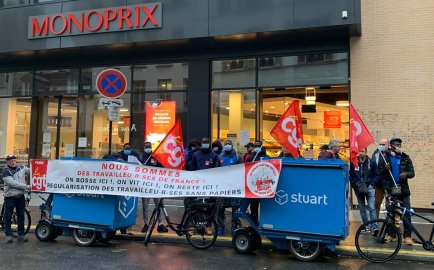France’s Labor Shortage List: Undocumented Workers Disappointed
In recent discussions on immigration and labor shortages, France has unveiled a new list aimed at addressing the need for workers in specific sectors. However, this list has left many undocumented workers feeling disheartened and overlooked. As the country grapples with significant labor shortages, particularly in industries such as agriculture, hospitality, and construction, the response from the government has sparked debate regarding the treatment and integration of undocumented immigrants.
The Labor Shortage Landscape in France
France, like many other nations, is experiencing a labor shortage that poses challenges to its economy. The sectors most affected include:
The demand for labor in these areas has grown, yet the reluctance to include undocumented individuals in the labor force highlights a missed opportunity. Many undocumented workers possess valuable skills and experience that could significantly contribute to these vital sectors.
Disappointment Among Undocumented Workers
The recent labor shortage list introduced by the French government has excluded undocumented workers, which has led to widespread disappointment. Many of these individuals have been living and working in France for years, contributing to the economy yet remaining unrecognized in official capacities. They face numerous challenges:
This situation raises critical questions about the policies in place that govern labor and immigration in France. The exclusion of undocumented workers from the labor shortage list appears to contradict the pressing need for labor in various sectors.
Current Immigration Policies and Their Impact
France’s immigration policies remain a topic of contention. The government has emphasized the importance of regulating immigration to protect the labor market. However, critics argue that these policies fail to recognize the contributions of undocumented workers and the potential benefits of integrating them into the formal economy. This is where the discussion around humanitarian parole and work permits becomes pertinent.
The concept of humanitarian parole, which allows individuals to enter or remain in a country for urgent humanitarian reasons, could be a pathway for undocumented workers to gain legal status and employment rights. Yet, the application of such policies in France remains limited, creating a gap between the needs of the labor market and the available workforce.
Comparative Analysis of Immigration Practices
When examining immigration practices in other countries, certain models stand out. For example, countries like Canada and Australia have embraced more flexible immigration policies that allow for the inclusion of undocumented workers in their labor markets. These systems not only fill labor shortages but also enhance the overall economy by utilizing the skills of a diverse workforce.
In the United States, discussions about immigration reform often revolve around programs like DACA (Deferred Action for Childhood Arrivals) and the impacts of policies like the 287(g) program, which allows local law enforcement to collaborate with federal immigration agencies. Such frameworks illustrate the complexities and challenges surrounding undocumented workers and their integration into the workforce.
The Way Forward for France
To effectively address the labor shortage, France must reconsider its approach to undocumented workers. Some potential solutions include:
By embracing these changes, France could not only alleviate its labor shortages but also foster a more inclusive society. Acknowledging the contributions of undocumented workers could lead to a more robust economy and a more cohesive community.
Conclusion
The recent labor shortage list in France has highlighted a significant gap in the country’s immigration policy—one that overlooks the potential of undocumented workers. As the economy continues to struggle with labor shortages, it is crucial for policymakers to consider the benefits of integrating this workforce into the legal labor market. By doing so, France can not only address its immediate labor needs but also set a precedent for a more equitable approach to immigration in the future.
As discussions around immigration reform continue, the situation for undocumented workers remains a pivotal issue that requires thoughtful consideration and action. The path forward must prioritize humanity and inclusivity, ensuring that every worker has the opportunity to contribute to society without fear of deportation or exploitation.










